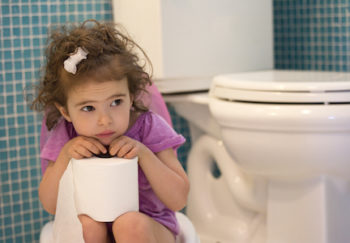
Constipation can be tough to manage no matter what your age. But for children — especially those who are not yet verbal — identifying and treating gastrointestinal issues takes time and may require physician intervention to get things moving again.
According to pediatric gastroenterologist Barrett H. Barnes, MD, approximately 25 percent of the patients his team sees in clinic are there because of constipation or related complaints. “This is not something parents and kids want to talk about, so it’s underreported,” he says. “Constipation is actually very common, so parents should know that they’re not alone.”
Signs of Slowdown: Symptoms of Constipation in Kids
If your child is old enough to communicate how he’s feeling, you may hear complaints of a stomachache or pain during bowel movements.
“It’s common for family members to mistake some symptoms for something else,” says Barnes. “Pain around the belly button, nausea, reflux and diarrhea, which occurs when stool overflows around a fecal impaction, are not-so-obvious signs of constipation.”
For parents of younger children, you may have to rely on other clues such as infrequent bowel movements and large, hard stools. Then, of course, there’s “the dance.”
“Kids often do the poopie dance or poopie yoga,” says Barnes. “They will hide behind the furniture, make you leave the room, cross their legs and hold onto things. Parents often think they’re trying to go when actually they’re trying to keep it in.”
Constipation Causes: Why the Holdup?
This withholding behavior — delaying or refusing to go — perpetuates the problem. “It’s a vicious cycle,” says Barnes.
Kids may experience a painful bowel movement, be too distracted by an activity or dislike using the restroom at school, so they’ll delay or resist when it’s time to go. This delay decreases the sense of urgency so that more time passes between bowel movements, making the problem worse.
“An overwhelming majority of kids with constipation have what is called ‘functional constipation’ caused by a pattern of stool withholding,” says Barnes. “Often the problem can occur around toilet training time — if the child isn’t ready, if it’s too early, or there’s negative pressure around toilet training.”
Underlying anatomic or neurologic issues are rare in cases of pediatric constipation, but it is possible. These include two rare disorders that cause constipation after birth and require surgery:
- Anal stenosis (abnormal anal structure or placement)
- Hirschsprung disease (a defect in which nerves are missing from the colon)
Then there are developmental or behavioral issues such as autism, which may not only inhibit a child’s bathroom behaviors, but they also impact a physician’s ability to treat constipation appropriately. This is why a behavioral psychologist is a key member of the UVA Health Children’s pediatric gastroenterology team.
“Our behavioral psychologists can help the child and family figure out if there are other factors that have yet to be diagnosed,” says Barnes. “We have to get those addressed before we can successfully treat constipation.”
Is your child suffering from tummy troubles?
Learn more about UVA Health Children’s pediatric digestive health services.
Treatments for Constipation in Kids: When to Seek Help
There are at-home remedies parents can try to offer kids some relief. For example, encouraging children to exercise, eat more fiber and drink more fluids may do the trick.
However, in most cases a diet rich in soluble fibers and fluids is better for preventing, not curing, constipation, Barnes says. “Parents can try dietary changes, but often a child showing symptoms of constipation will need medication as well,” he says.
This is why it’s best to see a doctor, especially if your child experiences any of the symptoms below:
- Changes in appetite
- Fewer than one bowel movement per day for an extended period
- Weight loss
- Involuntary passage of stool or urine
- Vomiting
- Bleeding with the passage of stool
To help relieve symptoms of constipation in kids, a pediatric gastroenterologist may prescribe a laxative, stimulant or stool softener. In more severe cases, an oral dis-impaction (similar to a colonoscopy prep) may be necessary to induce controlled diarrhea. Bathroom behaviors are important to address as well.
“We may encourage a parent to make sure the child is trying to use the bathroom after every meal, to use a supportive ring on the toilet seat and foot support,” says Barnes. “Most of the time, this combination of diet, medication and behavioral changes can take care of the problem. However, at this point, the constipation has probably been going on for months, so parents need to be patient because it will take a few months or longer to resolve.”
Our bodies do all kinds of weird things. How do you know when to ignore something and when to get to the doctor ASAP? We break down what’s normal and what’s not in our “Is This Normal?” series.

